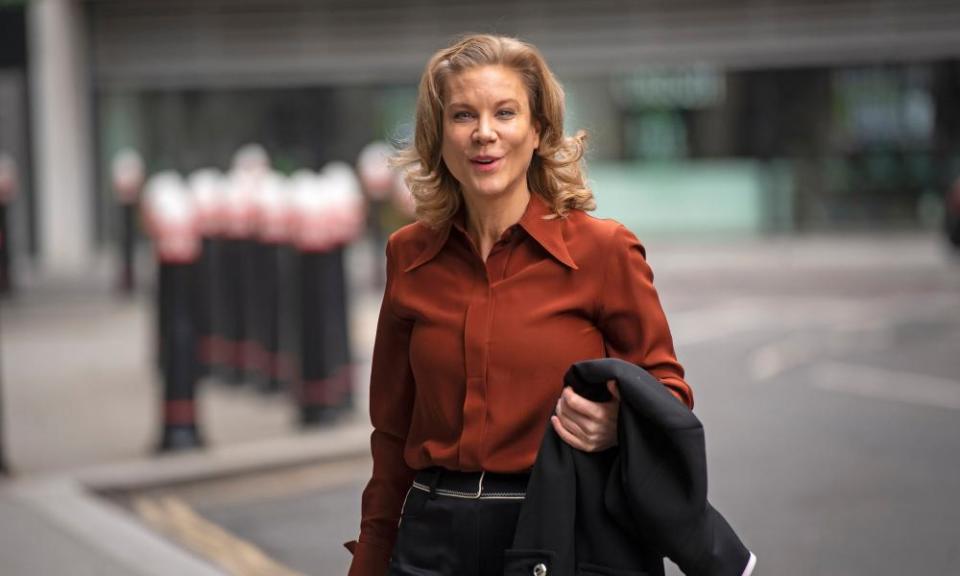Claim Amanda Staveley in charge of Abu Dhabi Barclays deal 'a fantasy', court told

A former director who helped manage Abu Dhabi’s sovereign wealth fund in 2008 said it was a “fantasy” to claim that Amanda Staveley was in charge of the Gulf state’s investment in Barclays, alleging that the businesswoman had “very limited knowledge” about those kinds of deals.
In a witness statement submitted to the high court, David Forbes said Staveley’s private equity firm, PCP Capital Partners, had not been given a mandate to manage Abu Dhabi’s investment.
Forbes, a former strategy director of the International Petroleum Investment Company (IPIC), said: “I understand the claimant’s case to be that PCP was in control, so to speak, of the Barclays investment and had the ability to remove IPIC from the deal at any point and replace it with alternative investors. This is, in my view, fantasy.
“To my knowledge its was never suggested, let alone agreed, that IPIC would invest in Barclays via any kind of private equity vehicle under PCP’s management or that PCP would manage the investment going forward.”
Amanda Staveley is best known for two high profile deals – each completed in 2008 and both involving the same investor: Sheikh Mansour of Abu Dhabi.
The first is the fundraising to rescue Barclays, which is now the centre of Staveley’s high court action.
The second is the role she played in Mansour’s acquisition of the Premier League football club Manchester City, where she worked with his advisers and connected them with the seller, the former Thai prime minister Thaksin Shinawatra.
While Staveley, 47, clearly has the ear of some of the world’s wealthiest people, it is not obvious how much she is worth herself, with most of her fortune thought to be located in the Middle East.
Her UK company, PCP Capital Partners LLP is only required to file very limited financial information with Companies House as it is classified as a “micro” company.
It has no assets or employees, but has longstanding debts of £3.6m, according to its accounts up to March 2019.
Staveley also rose through international finance without the usual footprint of years in an investment bank or top law firm.
She is described as self-taught by meeting wealthy men from the Gulf involved in the horse racing industry after, at the age of 22, reportedly borrowing £180,000 and buying the restaurant, Stocks, in Bottisham between Cambridge and Newmarket.
Staveley is suing Barclays for up to £1.5bn after her client, Sheikh Mansour bin Zayed al-Nahyan, invested £3.25bn as part of £11bn emergency fundraising by Barclays at the height of the 2008 financial crisis. She says Barclays secretly offered better terms to its Qatari investors, which meant her firm missed out on higher advisory fees than the £30m it actually received.
Barclays has called the claim “opportunistic and speculative”, and alleges that Staveley exaggerated the importance of her role in securing billions of pounds for the Barclays rescue package.
Forbes, who is the latest witness giving evidence for Barclays, accused Staveley of causing “irritation” within IPIC and said that Sheikh Mansour “lost patience with her and sought to minimise her involvement” in the deal.
“My colleagues and I were also getting fed up with Ms Staveley making promises and not delivering,” Forbes’ statement said. She was also “repeatedly seeking media publicity for herself in connection with the Barclays deal”, he added.
Staveley, who recently brokered the potential takeover of the Premier League football club Newcastle United, was accused of failing to understand some of the financial instruments that were used in part of the deal, including warrants, which give the owner the right to buy or sell shares at a certain price in the future.
Related: How Amanda Staveley took on Barclays over its 2008 Qatar rescue
Forbes said that in a meeting between Barclays, Goldman Sachs and IPIC in October 2008, Staveley interrupted the the Barclays chief executive, John Varley, to ask “what warranties come with the warrants?”. Forbes added: “The room fell silent and everyone suddenly found their shoes very interesting. Mr Varley looked surprised, but responded that he did not know what Ms Staveley was talking about.
“As time went on it became apparent to me and, I believe, all involved in the deal, that Ms Staveley had a very limited knowledge of financial instruments and transactions, or how to analyse them.”
The hearing continues.

 Yahoo News
Yahoo News 